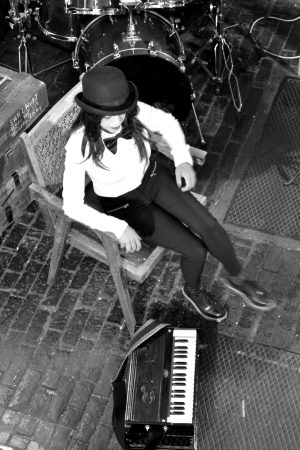Biography
“I am on a mission to bridge the boundaries between the two cultures, and hope to help Bengali Baul music to evolve by introducing international audiences to its rich tradition. My aim is to make it global”
Shapla Salique is one of Britain’s most successful British-Bangladeshi artists, and is famed for her original, powerful and emotionally-charged performances.
The East London raised singer-song writer, is known for her unique and edgy acoustic Bengali folk music, with jazz and funk influences. Shapla’s dynamic spiritual melodies and soaring vocals are gaining her recognition on the world music scene.
While Bangladeshi born Shapla Salique was growing up in Tajpur, Sylhet, she would often go to watch her father, uncle and grandparents perform in functions. They were renowned folk singers throughout the region of Sylhet.
Although Shapla seemed destined to step on stage sooner or later, she took everyone by surprise when she gave her first performance at the tender age of three!
During these early years, as well as developing her young vocals, Shapla also learned to play the harmonium. She continued to hone her singing skills at local gatherings and family functions.
In the late 1970’s Shapla’s father founded the first ever Bangladeshi folk group in the UK, Dishari Shilpi Ghosti. It was 1981 when Shapla arrived on UK shores. The Salique family settled in London’s East End.
Shapla naturally joined Dishari and eventually became the lead singer, specialising in Sylheti folk songs and the work of Kobi Nazrul Islam. In the years that followed Shapla fronted Dishari on numerous albums and TV appearances, as well as performances in the UK, Europe and Internationally. Highlights included performing in front of royalty at the Royal Albert Hall, in aid of Save the Children.

“Thinking back to my childhood, I can’t ever remember not singing! It was a non-stop adventure of road trips, on some occasions three or even four shows a day. It was exhausting and exciting, but I loved it!”
Shapla naturally progressed to a solo career:
In 1996 Shapla’s first mainstream Bengali song ‘Ziola’ was released in the UK under the music label ‘Journeys by DJ’. ‘Ziola’ was remixed by Judge Jules for his album ‘Dance Wars. ‘Ziola’ was followed by two diverse but equally well received solo albums; ‘Siyono na Siyona’ in 1997, a pop oriented Bengali album, and in 2002, the Hindi pop album ‘Lai’, produced and composed by Bappi Lahiri.
However, it has not all been plain sailing for Shapla. Conflicts of musical interests, tainted with family interference, left Shapla feeling that she could not truly follow her own artistic direction. Sadly, this led to a ten-year sabbatical from her music career.
“Life can be very unpredictable. You can’t always control what comes into your life. I have faced difficult moments and personal struggles, but I have come through it feeling stronger and happier. I am now in a better place than ever before”
Life now finds Shapla as a woman who has rediscovered and reignited her passion for music. She now has the power to be as diverse and creative as she wishes.
Shapla’s latest album ‘No Boundaries’ was released in April 2016. ‘No Boundaries’, brings Shapla’s unique style to Bengali folk songs which are over 200 years old. She pushes boundaries with her broad musical taste and talent. She has arranged, composed, and produced the album herself and describes it as “a perfect blend of East and West”.
The huge success of No Boundaries has gained Shapla global recognition, and a huge diverse ever-increasing fan base.
‘British-Bengali singer Shapla Salique’s music has created waves beyond borders’ –
ICE Today Magazine, Feb 2016
Shapla has performed at venues including, Hammersmith Apollo, Royal Ascot, the Barbican, BBC Radio (94.9fm), Houses of Parliament, Hackney Empire, Vortex Jazz Club, and at London’s South Bank.
She has also held solo concerts at the prestigious Wilton’s Music Hall. Shapla’s touring has included gigs in Canada and Italy. In 2014 Shapla was invited to speak and perform at a TEDX event in front of a celebrity filled audience at the prestigious Queen Elizabeth Hall in Westminster. This was also streamed globally and watched by over a billion people. She is in the top 100 most inspirational figures as listed by British Bangladeshi Power & Inspiration and Who’s Who magazine.
Shapla is promoting Bengali arts and culture to inspire the next generation of British Bengali’s who are moving away from the traditional elements of their cultural traditions.